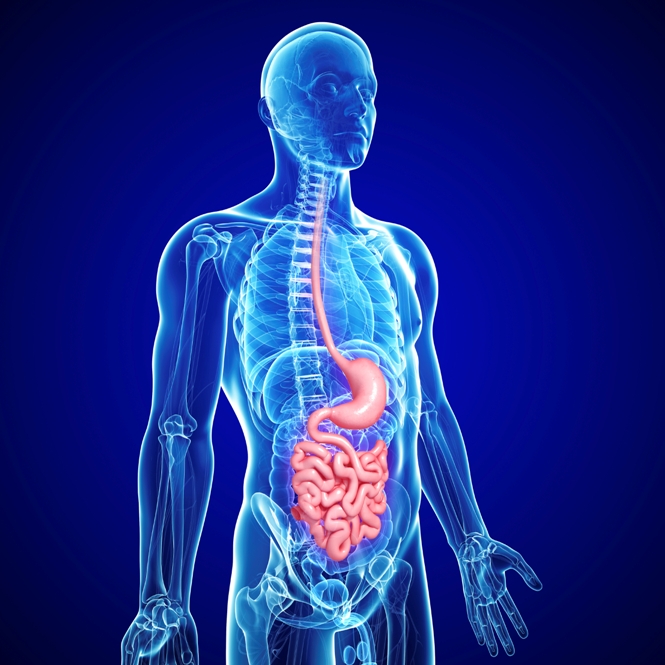Light-Based Therapy for Colitis
In last week’s Discoveries article, we showed how photodynamic therapy, or PDT, may be effective against rheumatoid arthritis and possibly other types of arthritis. In this post, we’ll explore how PDT may prove effective against another common inflammatory disorder: colitis. Colitis means inflammation of the colon or large intestine (also called large bowel).
As with arthritis, there are many different types of colitis. What these different types have in common are certain symptoms, namely abdominal pain, diarrhea, and rectal bleeding. The most common type is infectious colitis, which is caused by various bacteria such as C. difficile, Shigella, and E. coli.
Antibiotics are ill-advised for infectious colitis because these drugs tend to exacerbate bacterial imbalances in the intestine, thus amplifying the inflammation. The fast-spreading, epidemic nature of these infections (notably C. difficile) necessitates the search for reasonable alternatives to antibiotic treatment.
Along similar lines, the use of certain anti-inflammatory medications (aspirin, ibuprofen and other NSAIDs) are contraindicated for the treatment of colitis. These medications tend to damage the intestinal tissues and can aggravate the diarrhea associated with colitis. By damaging the intestine, they may also help perpetuate the underlying inflammatory imbalance.
What the Research Shows
In the first study of light-based therapy for colitis, researchers in Lausanne, Switzerland, explored the effects of low-dose PDT (using a low light intensity) with the photosensitizing agent ALA. The treatment was safe and effective, clearly improving symptoms and reducing inflammation in a mouse model for colitis. Three days after the light treatment, the severity of the colitis was reduced, as determined by colonoscopy and analysis of the colon tissues.
The Swiss study also found that a single low-dose PDT session was associated with reduced levels of the pro-inflammatory factors, IL-6 and IL-17. Subsequent PDT treatments resulted in even lower levels and a more sustained therapeutic effect, as reported in the July 2011 issue of Endoscopy.
A more recent study by Dr. Aurélie Reinhard and colleagues at the University of Lorraine in Vandoeuvre-lès-Nancy, France, demonstrated the efficacy of low-dose PDT in relieving colitis in mice. Based on endoscopy assessments, the treatment was shown to reduce the signs of colitis, decreasing ulceration and inflammation in the colon tissues. At the same time, low-dose PDT resulted in lower levels of TNF-alpha, IFN-gamma and other pro-inflammatory factors, as well as an increase in the anti-inflammatory factor IL-10.
Most impressively, according to their report in the May 2015 issue of Inflammatory Bowel Diseases, the anti-inflammatory effect of this low-dose PDT regimen prevented the development of colorectal cancer. This approach was shown to enhance the integrity of intestinal barrier permeability as well as the composition of the gut bacteria (microbiota).
These findings indicate that low-dose PDT may be especially valuable as a treatment for colitis in individuals with a high risk of developing colorectal cancer. Colitis itself is a risk factor for this cancer, but there are many other risk factors such as genetic factors, habitual smoking, sedentary lifestyle, and excessive consumption of red meat.
The precise mechanisms by which low-dose PDT cures colitis will require further study. According to Dr. Reinhard and her colleagues in a review published in the May 2015 issue of Expert Review of Clinical Immunology, this treatment “may alter cell–cell interactions and cytokine production by modifying the immune cells’ surface receptor expression. This anti-inflammatory property indirectly acts on gut microbiota composition and allows mucosal healing.”
Sources
Reinhard A, Bressenot A, Dassonneville R, Loywick A, Hot D, Audebert C, Marchal S, Guillemin F, Chamaillard M, Peyrin-Biroulet L, Bezdetnaya L. Photodynamic therapy relieves colitis and prevents colitis-associated carcinogenesis in mice. Inflamm Bowel Dis. 2015 May;21(5):985-95.
Favre L, Borle F, Velin D, Bachmann D, Bouzourene H, Wagnieres G, van den Bergh H, Ballabeni P, Gabrecht T, Michetti P, Schreiber S, Ortner MA. Low dose endoluminal photodynamic therapy improves murine T cell-mediated colitis. Endoscopy. 2011 Jul;43(7):604-16




 English
English Français
Français Deutsch
Deutsch Nederlands
Nederlands